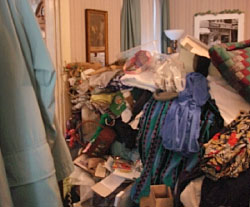 I’ve heard people express concern because they save things for the same reasons as the people they see on the hoarding shows on cable TV. They wonder if this means they are developing a hoarding problem. I have good news. This alone is not reason to worry that you are developing a hoarding problem. Whether we hoard or not, we all save items for the same four reasons:
I’ve heard people express concern because they save things for the same reasons as the people they see on the hoarding shows on cable TV. They wonder if this means they are developing a hoarding problem. I have good news. This alone is not reason to worry that you are developing a hoarding problem. Whether we hoard or not, we all save items for the same four reasons:
1. Emotional attachment—Items feel like an extension of ourselves, our families, our memories, our hopes, our dreams, etc.
2. Potential usefulness—Items may come in handy someday or may be worth money.
3. Intrinsic value—Items are unique, beautiful, a favorite color, etc.
4. Environmental conscientiousness—We want to find the best way to recycle or dispose of the items.
These are all legitimate reasons for saving things. The problem with hoarding is not a matter of keeping things for irrational reasons; the problem is the degree of interference we’re willing to tolerate in our lives, in order to avoid letting go.
So instead of worrying about the reasons you keep things, ask yourself the following questions:
- Am I able to keep track of my possessions and get access to what I need, when I need it?
- Are my possessions overtaking functional areas of my home? Am I able to sit on the couch, have dinner at the table, sleep in my bed, take a shower, etc.?
- Are my possessions overtaking my ability to engage in hobbies that I enjoy, either because I no longer have the space or I can’t access my supplies?
- Am I isolating myself socially because I don’t want people to see how I am living?
- Are my possessions causing tension in my relationships with my family and loved ones?
- Do I put off having maintenance done on my home because my things are in the way or I’m too embarrassed to let someone in?
- If my home were on fire, could I reach the nearest exit in any room in the house?
- Is the weight of my possessions causing structural damage to my home?
- Does the volume of my possessions make it difficult to keep my home clean?
- Do I feel unhappy and overwhelmed when I think about all my possessions?
- Do I avoid my home because my possessions are too overwhelming?
If your answers to these questions trouble you, now is a good time to consider making some changes.
Hoarding is a progressive disorder, meaning that it gets worse over time. If you have concerns that you have hoarding tendencies, it’s best to take action as soon as you’re aware of the potential problem. The International Obsessive Compulsive Foundation Hoarding Center website has links to excellent self-help books and a variety of web-based support groups. You can also enlist the help of non-judgmental friends and family, or a professional organizer (preferably one that belongs to the ICD). If your concerns still exist after trying these measures, it may be time to seek a therapist who is knowledgeable about hoarding and its treatment.
